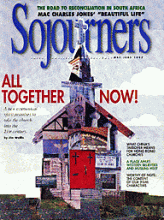Evangelical and ecumenical have been terms unfortunately divided. The "evangel" is the uniter. The "good news" of Jesus Christ should be that which draws Gods creatures and Gods church together.
We evangelicals have too often used the term as a badge of identity that distinguishes us from others and other Christian traditions. The ecumenical movement, on the other hand, has been primarily a Protestant mainline gathering, often with something less than appreciation for evangelicals.
A case in point: As Drs. Ray Bakke and Bill Leslie and I founded the Seminary Consortium for Urban Pastoral Education (SCUPE), we envisioned a consortium of seminaries representing the broad spectrum of Christendom. There was pain in the experience as the president of a mainline seminary decided to educate us with a kind of haughty air, saying, "You must understand that we come from the fine tradition of 19th-century liberalism and thus have no truck with evangelicals."
When later we did achieve his presence at an organizing meeting, the representative of a well-known evangelical seminary stood with flushed cheeks to tell the assembly that his evangelical credentials hardly permitted him to sit in the same room with liberals.
My hope and my prayer is that ecumenism is healing this unnatural divide.
In the decade of my staff position with Young Life, and in the denomination of my birth and ordinationùthe Christian Reformed Churchùthe discussion of differentiation between word and deed was often more like hot debate than discussion, and too often the debate raged as a means of avoiding the obligations of social justice action. Too often social justice action is judged by evangelicals to be a liberalization of the gospel, and is thus unattended.
Read the Full Article

